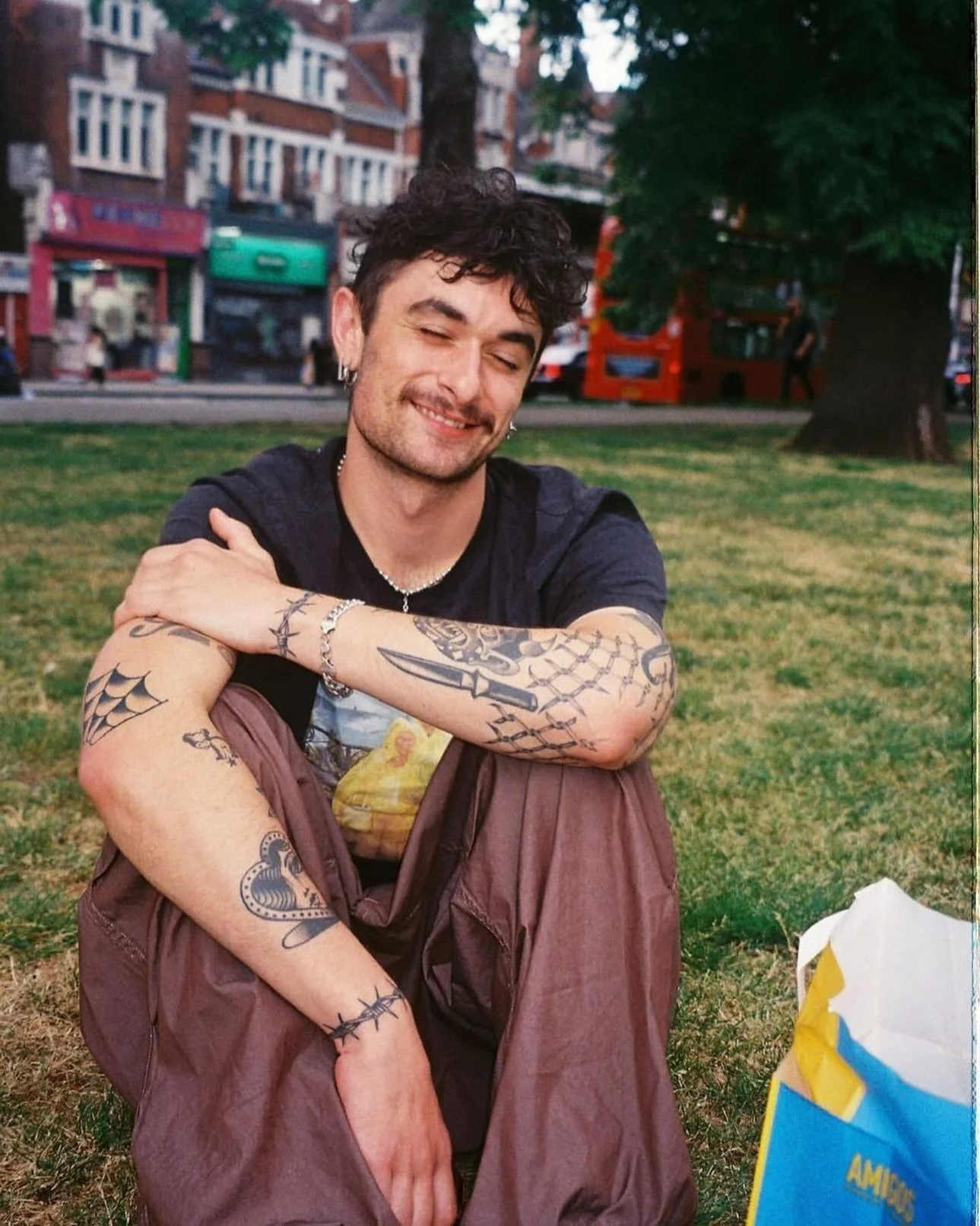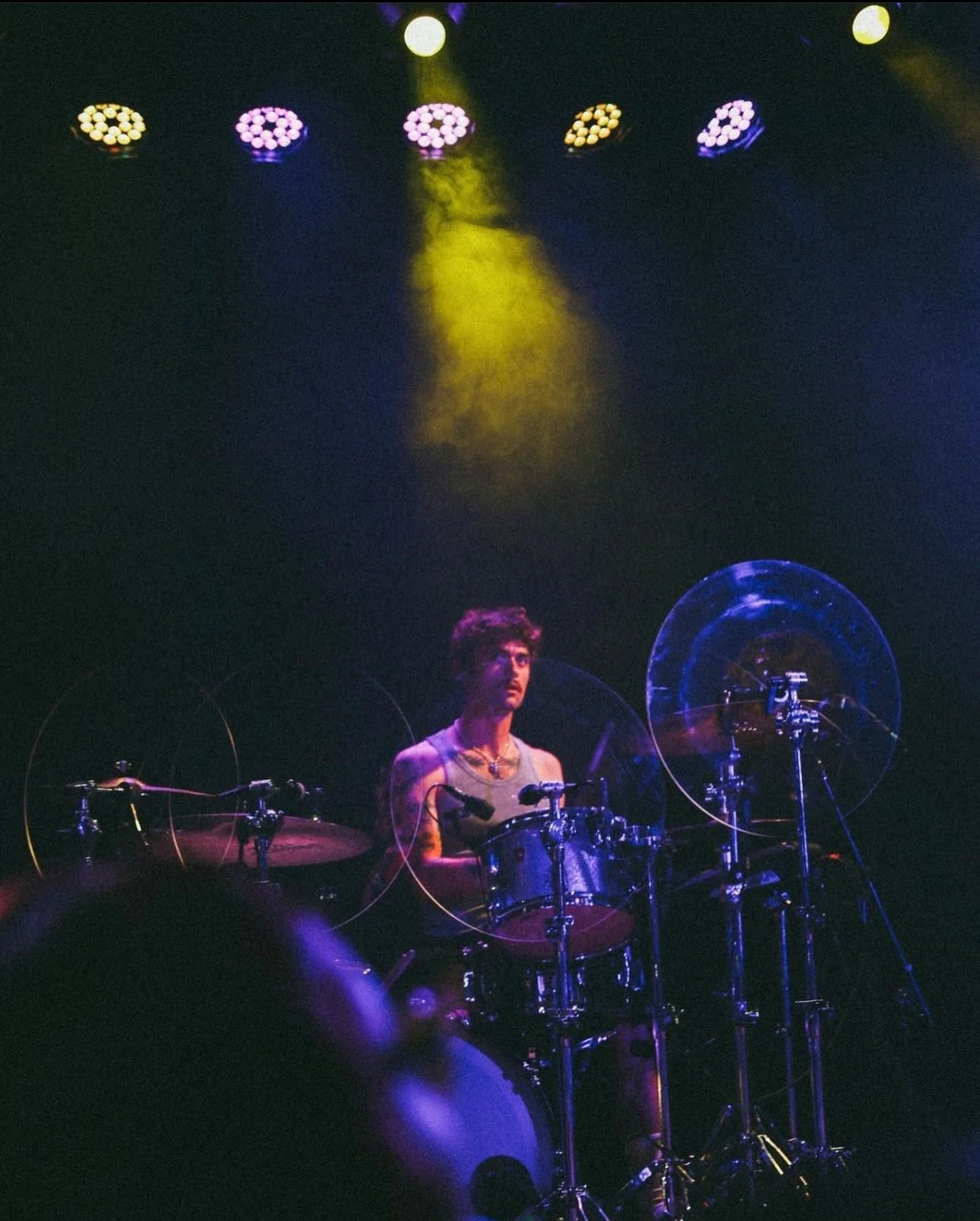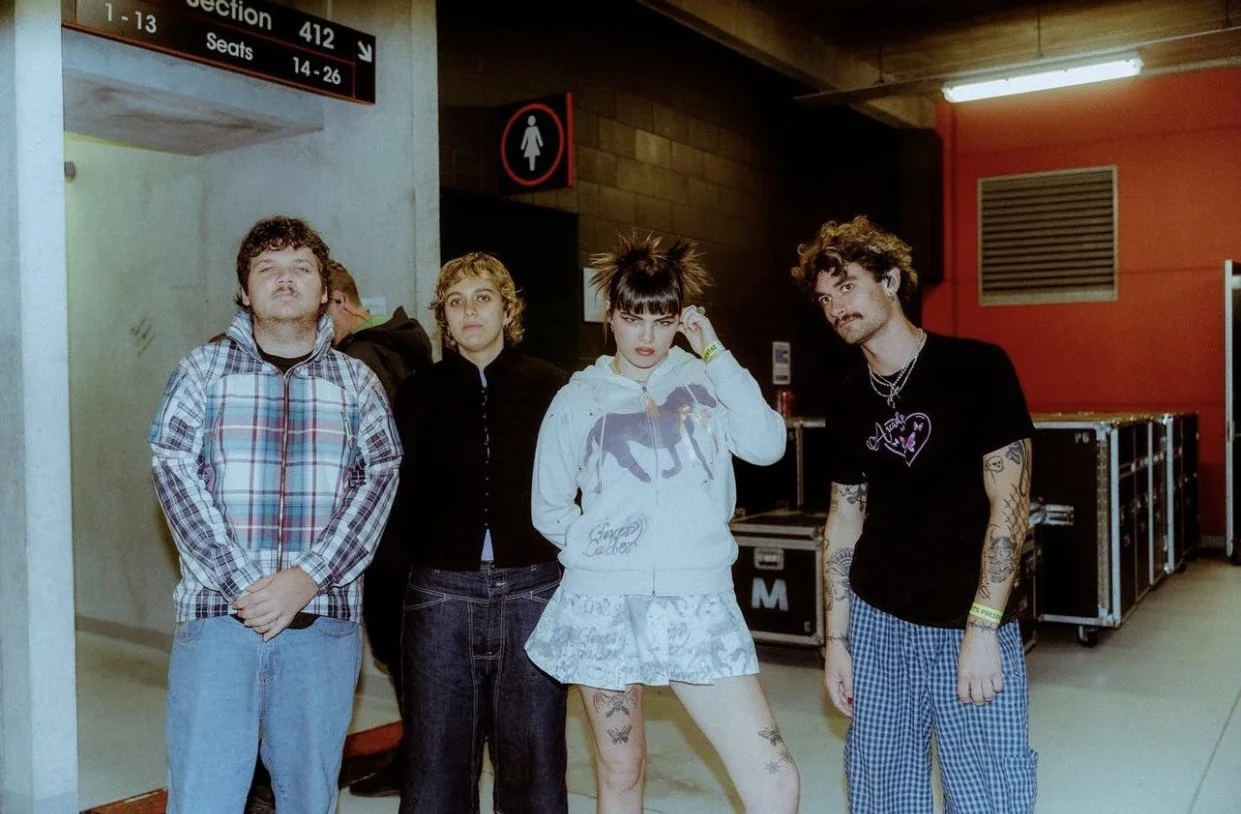Felix Holton on Producing, Playing Coachella, and Dealing with Post-tour Depression
Words by Rosa-Lee O’Reilly. Images by Cam Hay and Hope Tala.
Felix Holton is, undeniably, a wizard on the drums. From performing at Coachella and touring with musicians like BENEE, Bea Miller, Haley Knox, and Olivia Rodrigo by night to producing music and teaching drum lessons by day, the New Zealand native has found his footing on the Los Angeles playground.
With his fingers in many pies at once, one rarely catches a musical nomad like Felix Holton in the dead of light, as he is most likely off on a roller-coaster ride of shows, cities, states, and borders. But on a regular day in January–during a cocooning period in the music world–Rosa-Lee O´Reilly was lucky enough to catch up with the dynamic drummer.
They chatted about imposter syndrome, stepping out of one’s comfort zone, post-tour depression, doing what one loves as a career, and learning how to keep loving it when it becomes a way to support oneself financially.
Rosa: So, you’re living in LA now? That’s your new home?
Felix: Yeah, I fully live here now. It worked! However, I do wake up with anxiety every morning…
Rosa: That’s probably a bit of imposter syndrome kicking in.
Felix: Definitely, as a New Zealander who has grown up to view the world in a way where we have to be really humble and be like: “Oh, I'm not really that good,” we often put ourselves down. In contrast to people here in LA who are like “I’m THE best. And I have been THE best since I was five years old.”
Rosa: It’s so lame, isn't it? I feel like so many people in New Zealand have these big dreams that are never acted upon or are even afraid to admit what they are.
Felix: We are also kinda lucky that we have that attitude because when we do meet other people, they’re like, “damn, you’re so humble and grounded”,... And then I’m like, “No, I just have no self-confidence, haha.”
Rosa: I think you need a good balance. I also think we hear about going over to America and “making it”, and it seems really far-fetched. But here you are doing it. It is within reach. It just goes to show you should follow your dreams. Despite it being the slow season in the music world, you have still managed to keep yourself busy. Tell us about producing your remix of Grayson Gilmour's track "Day Moon."
Felix: Grayson Gilmour was actually my lecturer at Massey University in my final year. It was the year we had to work on a final project–my project was an EP, which was the first time I had written and produced my own work. Grayson was super encouraging with that process when I first started. So, it was a cool, full-circle moment for him to turn around three years later and ask me to do this with him!
Rosa: I feel like your identity is tied to being "the drummer." How has it been stepping out of your comfort zone and doing something different?
Felix: The moment I start thinking, "I'm a drummer" or "I'm a producer", I stop doing the other things that also make me happy. It is much harder to release something that feels like it's not your thing or what you're best at. I have anxieties with drumming, but it is much less than producing. Sometimes, I don't know right from wrong when I sit down to produce. When making this remix–something I had never done before–it took me quite a few weeks of going through different ideas to figure out how to tackle it.
Rosa: And what was the inspiration?
Felix: I was watching a lot of skateboard videos on YouTube at the time. In particular, one brand called PALACE makes sick videos shot with a fisheye lens and has Jungle music and 80s drum and bass playing in the background. I thought: "I wanna make the remix kinda like that!"
Rosa: Music is ever-expanding. Musicians are taking on new disciplines and doing a whole bunch of things these days. They're not just songwriting; they're directing their music videos, doing the hair/makeup, and building the set. You can keep going and going–I think that's what is so awesome about it.
Felix: That is also a product of music; you must be well-rounded. To make a living, you've often got to do other things.
Rosa: Talking about living, how has the past couple of years been for you?
Felix: The biggest thing for me has been moving to the States. The whole process of getting an O-1 Visa was much larger than I ever expected. Oh, and playing Coachella was for sure a childhood dream of mine!
Rosa: Would you say that was your proudest moment as a performer?
Felix: It was one of the best shows we have ever played. As a band, we tend to be so hard on ourselves. We always come off stage, saying, "That part could've been better," or "My shoulder hurt during the intro." Just little things that you are hyper-aware of when you're playing. But when we hopped off stage after this show, we were all high! We were all locked in during the show because so much prep went into it, and we knew how much of a big deal it was. As soon as we started playing the intro to "KOOL" – with these big stabs that hyped the crowd up– Dylan [guitarist, fellow member of BENEE live band] and I looked at each other and were like: "Dang, this show is going to be fun!" Overall, it went so well. If it had gone wrong, it would not have been great. You don't want to have a shit show at Coachella, haha.
Rosa: As a musician–or any creative–I think it is easy to be super self-critical.
Felix: For sure. There is also a point during a tour when everything gets weird. Usually around show number 35.
Rosa: You're probably delusional and very sleep-deprived. What has touring with musicians besides BENEE been like?
Felix: The Bea Miller tour was the first time I had gone on tour with another artist other than BENEE, which meant the first time learning multiple new songs and working with an all-American crew–which was such a valuable experience. It was f*** ing scary, but I was relieved that it all went well.
Rosa: With all new and unknown things, our brain initially tells us that we can’t do it. You have drummed for BENEE for so long, and so, it's like clockwork for you; you can do that in your sleep.
Felix: Exactly! And it becomes part of you. I hadn't had to use that part of my brain for learning new songs in so long. We'd get given a couple of new songs for BENEE once a month. But when I was working with a musical director for this new crew, they were like, "Okay, here are just over 20 songs that you should just learn, not that you're going to play any of them, but just in case the artist decides to change the set list around."
Rosa: And how do you practice?
Felix: I don't have a private space in LA where I can play my drums. Plus, my girlfriend and I live in a studio apartment. So, I have this practice pad set up in the same formation as a drum kit. There was a time when we'd do this thing every day where she’d put on her Apple Airpod Max noise-cancelling headphones, and I'd quickly burn out a couple of songs and try to learn them.
Rosa: You make it work with what you've got!
Felix: I think that’s what helps with being from New Zealand. You get to that first hurdle, and instead of saying, “I can’t do that”, you’re like: “How can I use some creativity to make this work?”
Rosa: Kiwi ingenuity! Everyone in NZ starts off in their garage–not like people in LA who went straight to a Hollywood studio for their first session. It must be hard not to compare yourself to those people…but your difference makes you special. It is your superpower, in a way.
Felix: Totally, you have to train yourself to look at it like that. Because there are two ways you can look at it a) damn, I am so worse off than so many of these people, or b) actually, I don’t know many people who have moved to the States from New Zealand and are doing what I am doing, so, pat yourself on the back.
Rosa: What you’re doing is pretty extraordinary. But I know it can feel different to how it looks on the outside. How do you navigate post-tour depression?
Felix: I always associated the highs and lows with the experience during the tour. The highs are when you're performing a show, and the lows are when you're not playing because it's quiet. But I honestly felt the lows after the tour ended. You return home after two months of feeling extremely valuable and like your purpose was used daily. Then, when you hop off, you're like, "I have nothing."
Rosa: You're going from 100 to 0 real quick.
Felix: Totally. A lot of close music homies always mention the importance of routine. So I've been running and cooking daily and learning one thing on the drums and one thing unrelated to music. It's all about having little things consistently filling up your cup. After the tour, you have these days where you want to just lay around and do nothing. You should give yourself a few days to do that–catch up on sleep and all that. But there gets to a point, as my mum would say, “You are naval-gazing too much.” As in, you don’t want to spend too much time moping around and thinking about yourself too much.
Rosa: On tour; everything is set up for you. It is very go-go-go.
Felix: You’re stimulated. You wanna go get some food? Okay, you’ve got $20 in cash the tour manager has given you. Whereas, in normal life, when I’m hungry, I’m like, “Should I really spend $20 on food?” You question everything a whole lot more.
Rosa: I think no matter what you do in life (whether that's playing shows at Coachella or working in a corporate office), as long as you have your basics down packed, those are the things that are going to bring you back down to earth and ground you. Happiness comes from the simple things.
Felix: It’s those little things that are actually necessities for yourself. If you can take away all the other things going on in your life, and you feel somewhat good in your base, it will make everything else much better.
Rosa: It is hard to find that balance when you combine what you love and do for work.
Felix: For sure! Suddenly, you're taking what you usually do after work because it gives you a cathartic release…to pay your rent. I get how it is very easy for music or any art to turn into a job and just a job. But I always remember to take it back to day one. My mum reminds me that when I was growing up, I'd say, "I just want to be a drummer; I don't care what else I do; I don't care if I'm poor. I want to play drums forever because I enjoy nothing else as much."
Rosa: It is always a good reminder to stop and pause for a moment. And be like: “Wait, this moment is what I have been dreaming about and envisioning for so long, and now I'm actually f***ing doing it!”
Felix: Forget about all the bullshit, forget about what day rate you’re getting paid for this moment. If you strip back all that stuff and look at it for what it is, you remember exactly why you did it in the first place. If you love something enough, you'll make it work.




